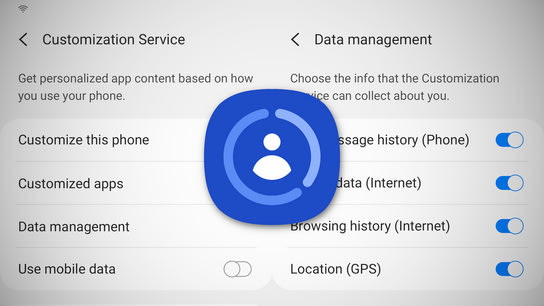Samsung customers have likely been prompted by their devices to opt into the Samsung Customization Service (SCS). The prompt doesn’t explain what SCS does beyond linking you to its longwinded privacy policy. I was uncomfortable turning it on without knowing more about it, so I read the privacy policy. Yikes. Samsung collects everything it can get its corporate paws on.
I turned it on, let it collect data for a week, and then tried to limit its collection. I used personal data exports from my Samsung Account to compare and confirm that it did indeed reduce its collection. I can confirm that either the method described in this article works or alternatively that Samsung is in breach of the GDPR.
Samsung says SCS provides you with “personalized content based on how you use your phone and devices”. In reality, it only provides a handful of minor features in exchange for uploading a lot of your personal information to Samsung.
Samsung has published a dedicated privacy policy for SCS. You should read it. It’s unusually straightforward about collecting your contacts, calendar, calls and messages, search and internet browsing history, location (GPS and Wi-Fi), and other data off your device. It doesn’t disclose how long it retains the data, and leaves itself plenty of maneuvering room when it comes to its use.
Unless you need SCS enabled on your Samsung devices, you should probably turn it off. Unless you know why you’ve enabled it, then you should also turn it off. You can always turn it back on if you later discover that one of your favorite features requires it. You can turn it off from the Settings app: Privacy: Samsung: Customization Service screen.
Maybe you really want one or two features that Samsung has gated behind its privacy-intrusive SCS service. Samsung has gated some enthusiast and basic features behind users opting into sharing data with the company. Pro tip: The gating is somewhat porous. Some apps let you enable a gated features while you’re opted in, but doesn’t turn them off again if you later disable the Customization Service.
For instance, the Samsung Galaxy Fit2 activity monitor will disrupt your sleep by shining a bright light into your eyes unless you’ve opted into SCS. Samsung requires SCS to enable the companion device’s “Good night mode” which turns off its display at night. The Fit2 itself is a sleep monitoring device, so it’s unclear what value Samsung’s cloud services provide here. It’s not like the device isn’t purpose-built for detecting sleep and could turn off the display when it notices that you’ve fallen asleep.
If you decide to leave the service enabled, then Samsung lets you opt out of the collection of call/message history, search and browsing history, and location history. You do this by clicking on Data management on the same screen as before. Depending on which SCS features you use, you likely won’t notice any difference after disabling these data points.
Samsung does not provide you a choice to opt out of the collection of Samsung Health data, calendar events, app and device usage statistics (what apps you use and how long), or information about your music collection/playback history and photos. Samsung already has your health data if you use its apps. However, it would be nice to disable any usage of health data for personalizing ads and Samsung services.
A list of your installed apps can say a lot about you, and it may contain a lot of data you don’t want to share. For example, it may contain hints about your medical needs, political leanings, and even sexual orientation. What are you doing on a niche dating app all day? Do you really spend two hours on Reddit and mobile games daily? Why do you use your phone so much during work hours?
You can block the Customization Service from accessing your device usage metrics through the Android permissions system. Open the Settings app: Apps, click on the overflow menu (three dots in the top right corner), and select Special access. Click Usage data access and select Customization Service. Tap the toggle to disable its access.
I’ve confirmed that this works by requesting my personal information from Samsung and verified that app usage data stopped appearing after making this change. It’s not guaranteed to work forever, however.
As the device manufacturer, Samsung has blocked you from disabling permissions for many of its preinstalled apps. It’s your device, but the company still retains a lot of control over it. However, it has forgotten to prevent you from disabling this intrusive special permission. Praise be to Samsung’s incompetence, which works to the user’s advantage in this instance.
SCS is Samsung’s version of Google’s Android System Intelligence (formerly named Device Personalization Service (DPS)). Google is in the same racket, but it offers significantly better features in exchange for your data. If you’re interested, then read the Binary Hick’s forensic analysis of DPS from May 2020.
In Android 12 on some devices, the System Intelligence service is moved [at least partially] on-device under the branding “Private Compute Core”. It’s unclear exactly how much data is processed on-device and whether it still uploads some or all of it, or the analysis results, to Google.
In my opinion, the whole Customization Service is an unnecessary “feature” that only exists to collect more data about you. Turning it on can offer some small feature improvements and benefits in some apps. However, I’ve seen nothing from it that couldn’t have been implemented on-device without sharing the data with Samsung.
On the other hand, once you’ve limited its data collection, then the service doesn’t collect more information than what every other app on your phone is also grabbing. SCS is a blemish on Samsung’s Android products, and I can only hope they follow in its competitors’ footsteps and move towards more on-device analysis and less data harvesting.
